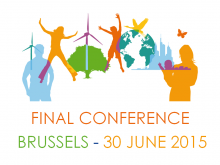On 30 June 2015, the CECILIA2050 consortium held its final high-level expert conference on EU climate policy beyond 2020 in Brussels. Nearly 60 participants from NGOs, academia, industry and government engaged in dialogue and debate on the present, past and future of the EU climate policy mix, with an emphasis on the long-term objective of decarbonisation.
In October 2014, the EU decided on its climate targets for 2030; thus, the impetus is now on the design and the efficient implementation of policy instruments to meet these goals. The path to a low-carbon economy calls for significant transformations—not only in the power and industry sectors but also in transport, buildings and agriculture—and therefore encompasses many facets of the EU economy. However, with the long-term goal of decarbonisation in mind, the EU must consider the implications of its immediate choices on the post-2030 options. How will EU climate policy progress past 2030? What actions must be put on the table now to ensure low-carbon transformations in the future? The CECILIA2050 project has been designed to tackle such questions and is charged with assessing the current EU climate instrument toolbox in order to identify pathways and options for future policy development. The final conference of the project served as a topical forum to connect current research with the policy-making process, facilitating discourse on the near and not-so-distant future of climate mitigation.
Attachment:
Citation:
Funding:
Year of publication:
Number of pages:
Table of contents:
|
1 |
Introduction |
3 |
|
2 |
Keynote speeches |
4 |
|
3 |
Key insights from CECILIA2050 - panel discussion |
5 |
|
4 |
Breakout sessions - "Starting the transition now - 2020 policies for 2050" |
7 |
|
4.1 |
Changes to the energy system |
7 |
|
4.2 |
Institutions and governance - fit for decarbonisation |
9 |
|
4.3 |
Public acceptance and political feasibility of a low-carbon Europe |
10 |
|
5 |
The role of economic instruments for the EU - panel discussion |
11 |
|
6 |
Annex A: Conference programme |
13 |
|
7 |
Annex B: List of registered participants |
14 |
|
8 |
Annex C: Twitter history |
16 |
| 9 | Annex D: PowerPoint Presentations | 16 |


